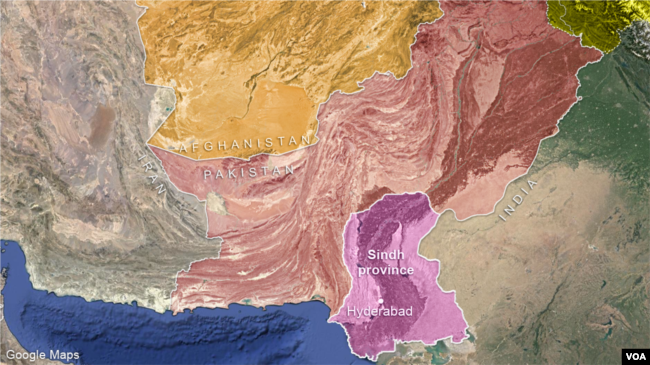A judge in Pakistan's capital, Islamabad, placed two Hindu girls, allegedly under the age of 18, in government custody Tuesday and ordered a "fair and transparent inquiry" into their circumstances that is to be presented to the court in a week.
The girls, Reena and Raveena, were allegedly forced to convert to Islam and marry Muslim men. Their family filed a police report saying they had been kidnapped from Ghotki in Sindh province, where a majority of Pakistan's Hindus live.
But the girls filed a court petition saying they were over 18 and had willingly converted to Islam and married the men they wanted. They also sought protection from their family, claiming the family had harassed and threatened them.
The case has once again brought to the forefront the longstanding complaint in Pakistan's Hindu community that minor girls were being kidnapped, and that conversion and marriage were being used as legal cover to protect the abductors. The community also claimed the girls were threatened with harm to themselves or their family members to give false statements in court.
While the Hindu community has the largest number of such complaints, other minorities have faced the same issue. Last month, a Christian woman in the Punjab province reported that her 13-year-old daughter was kidnapped from her home by several men. Her abductors claimed she had converted to Islam and was married to one of them.
Mohammad Sarfaraz Khan Aibak, the police officer conducting the inquiry, told VOA the girl had given an affidavit in court that she was 18 and knew what she was doing. He also said the girl "refused to take a medical examination" to determine her age and could not be forced to take one against her will.
Abiak claimed the family did not have a birth certificate. But the family's lawyer, Lazar Allahrakha, shared with VOA the copy of a church certificate called a "dedication certificate," often used by the country's Christian community in lieu of a birth certificate. He also shared a copy of a school certificate. According to both documents, the girl was born in 2005.
Pakistan law
Human rights lawyer Asad Jamal said even if a girl was a minor, under Pakistani law, marriage to an underage person could not be invalidated if she claimed she had done it willingly.
"The girl's statement is very important in such cases," he said.
Minority communities complain that minor girls should not be allowed to make such life-altering decisions.
"They are innocent. They don't know anything at this age," said Kheeal Das Kohistani, a Hindu member of parliament from Sindh.
In addition, Kohistani said, there was no way to determine whether the girls were giving their statements under pressure unless they were taken away from the men who had allegedly abducted them.
"They should be kept in a shelter home for 15 to 20 days, and their parents should be allowed to meet them," he said.
VOA's own investigation in Sindh province two years ago showed that not all cases involved kidnapping or use of force. Some minor girls eloped with Muslim men against their family's wishes and changed their religion since marriage between a Muslim and a Hindu is not allowed in Islam. The parents often claimed kidnapping, since local police were unlikely to take action if it was determined the girls left willingly.
However, rights activists say taking a girl under 16 away from her legal guardians is illegal under any circumstances.
"The law says that if a girl is under 16, if she is taken away from her legal guardians even through enticement, whether you've made her believe she is in love or lured her away any which way, the law considers it kidnapping. It does not necessarily have to be use of force," said Jibran Nasir, a human rights lawyer who follows these cases closely.
Pakistan's law also says a girl under 16 cannot consent to sex. "So, if you had consensual sex with someone under 16, that is still considered rape," Nasir said.
Pir Mohammad Ayub Jan Sarhandi is one of two Muslim clerics in Sindh province the Hindu community blames for most of the conversions and marriages. He told VOA that he always ensured a young girl was making her decision freely without any pressure, but said he did not agree with the legal age for marriage.
"They say a girl is not mature till she is 18. We condemn this law. We do not accept it. We will never accept it," he said.
Several Pakistani clerics believe a girl is ready for marriage with her first menstrual cycle.
Reena and Raveena
The Sindh government took notice of Reena and Raveena's case when a video went viral of their father helplessly beating himself outside a police station and asking people to shoot him.
Seven people have been taken into custody for their alleged involvement in the marriages, including members of the husbands' families and the man who performed the marriage ceremony.
Prime Minister Imran Khan also ordered an inquiry, which Kohistani said was a good first step but not enough.
"He should come in the parliament and help make a law against it. That is what will give them instant relief," he said.

No comments:
Post a Comment